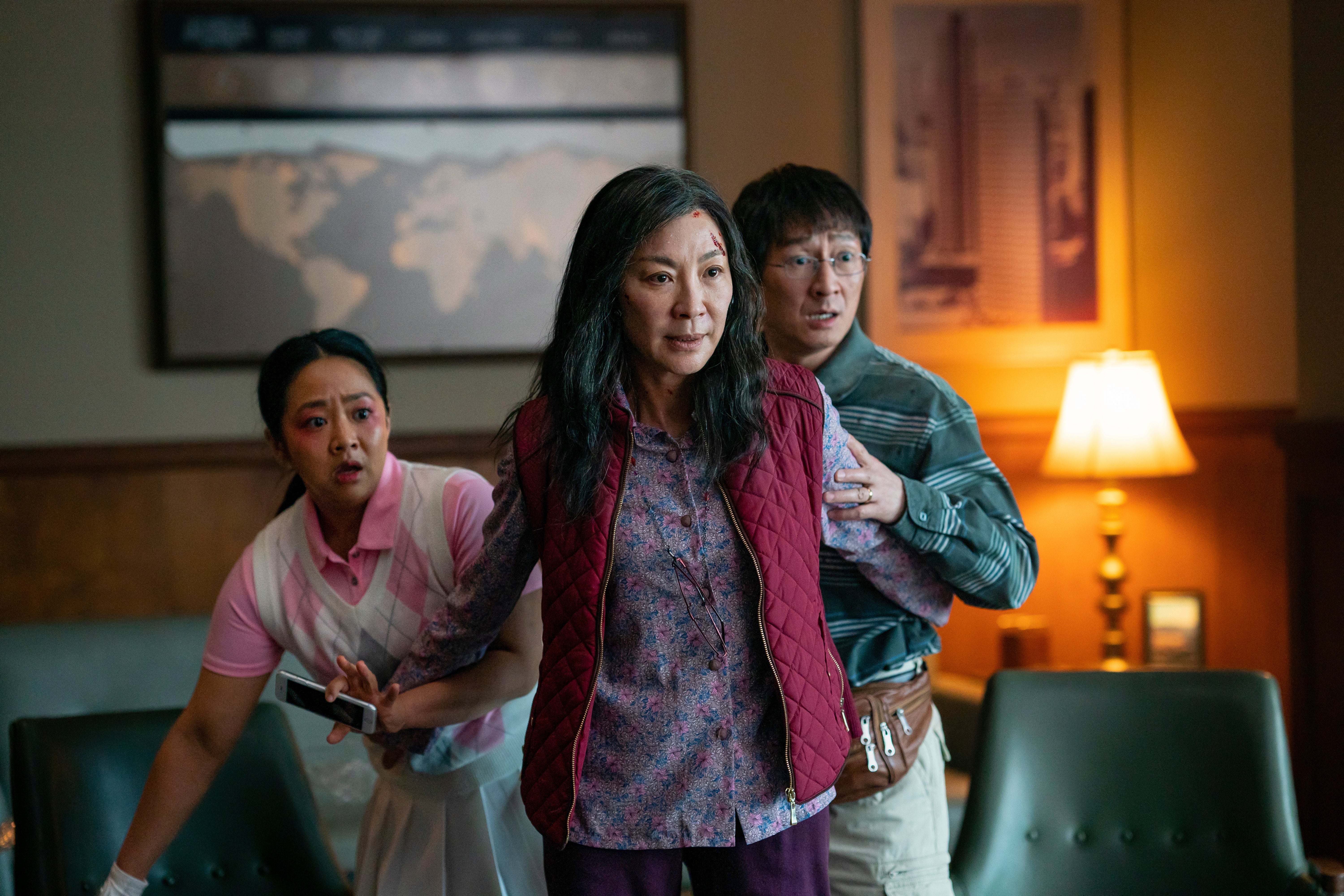Who are A24 – the company behind Uncut Gems, Euphoria and Hereditary?
The people behind America’s hippest production company are determined to keep themselves out of the spotlight. As their latest cult hit ‘Everything Everywhere All at Once’ is released, Tom Murray explores their phenomenal success, with a little help from director Ari Aster

In Everything Everywhere All at Once, Daniel Kwan and Daniel Scheinert’s new multiverse-spanning film about an exhausted Chinese American laundromat owner, there is a universe where Michelle Yeoh is an opera singer. There is also a universe where she’s a martial arts master. There is even a universe where she has hot dogs for fingers.
It’s the kind of head-spinning plot that few film studios would take a chance on, which is exactly why it was perfect for A24, the outfit behind Uncut Gems and Euphoria.
A24 is not like other entertainment companies. For a start, it was founded on the wrong coast – New York, not Los Angeles – by three relatively young arthouse film executives, Daniel Katz, David Fenkel and John Hodges, who decided they wanted to do things differently.
Since its inception in 2012, A24’s risks have mostly paid off. The first film A24 produced (with the additional backing of Brad Pitt’s company Plan B) as well as distributed was 2016’s Moonlight, which won the Oscar for Best Picture... eventually.
Its latest release, Everything Everywhere All at Once has earned the best per-theatre average of any film since Spider-Man: No Way Home at the box office on its opening weekend – nearly $510,000 (£391,000) from just 10 theatres. It’s become the social networking movie site Letterboxd’s highest-rated film ever, toppling Parasite in just three weeks of limited release.
I first fully became aware of A24 in 2017, watching an unrecognisable Robert Pattinson playing a small-time crook in Josh and Benny Safdie’s crime thriller Good Time. There was something familiar about this effortlessly cool production that was totally unfamiliar at the same time.
The other A24 films I’d seen – Jonathan Glazer’s underappreciated masterpiece Under the Skin, Alex Garland’s elegant directing debut Ex Machina, and Yorgos Lanthimos’s typically bizarre The Lobster – also refused to fit the Hollywood mould. There was no “safe bet” or sequel or prequel, just unbridled creativity.
Everybody knew that the cost of working with Miramax was that Harvey would get his mitts on it and would f**k with it
In my research, I found that while much had been written about their releases, very little had been written about A24 itself and even less so about the people who run it. On the entire internet, I found just two interviews with Katz and Fenkel (Hodges exited the company in 2018 to front Jax Media, the production company behind Netflix’s Emily in Paris), both conducted five years ago, with GQ and the Wall Street Journal.
Cut to me standing in London King’s Cross train station, a finger in one ear, trying to listen to A24’s publicist, who was not publicly listed but had fortunately worked with a friend and former colleague. The publicist wants to know who I am and why I want to speak to A24. Why should an entertainment journalist want to speak to one of the most successful production companies in recent years anyhow?
I am granted access to a “source close to the company” on background who must not be named nor quoted. On the call, the source is embarrassed to be connected by a publicist, thinking that very Hollywood indeed. They then confirmed that A24 did not take a very Hollywood approach to self-promotion or, indeed, anything. That New York, “outsider”, status is engrained in the way A24 operates, they said. While the firm has grown exponentially in the past 10 years, employees still work in an open-plan office where the co-founders mix with the interns and there are no job titles, just colleagues.
Ultimately, the source says, they want the focus to be on the work they’re putting out, not the people responsible for doing so. Thankfully, there are people who know about A24 who don’t work there. Who better than acclaimed director Ari Aster, currently in post-production for his third film with A24, Disappointment Blvd., starring Joaquin Phoenix, following the success of his first two horrors: Hereditary (2018) and Midsommar (2019).

Aster embodies everything about A24: he is young (35), from New York City, and very nervous to be speaking to press. “Whenever I’m talking to somebody who’s going to make sure that my words are cemented in posterity, I become paralysed,” Aster says apologetically over the phone. He’s not lying; our conversation crawls, agony in every syllable, then lurches from Miramax to Hereditary’s shock success.
I ask him about Miramax because it’s a comparison lots of people have made with A24 – in the Nineties, the studio helmed by Bob and Harvey Weinstein cemented itself as a similar cultural tastemaker through indie hits like Pulp Fiction and Good Will Hunting.
However, Aster says there’s a key difference: “Everybody knew that the cost of working with Miramax was that Harvey [Weinstein] would get his mitts on it and would f**k with it. So that was never something that I was romanticising.”
Aster adds that A24 is not looking for “prestige films” that chase the Oscars in the same way Miramax did, which “can be a handicap”; it’s looking for “people with a voice”.
Sofia Coppola, who has directed two A24 films, told GQ in 2017: “I really like those guys [at A24]. They don’t have the personality of movie executives.”

Since I don’t know many movie executives, I ask seasoned cinematographer Shane Hurlbut, co-founder of the Filmmakers Academy, what Coppola meant. He gives the deep, belly laugh of someone who’s been f**ked over repeatedly by producers over the years, and says, “what she’s implying there is that they are risk-takers. They’re fierce.” He adds that A24’s mentality is to “jump out of a plane, and then figure out how the hell [they’re] going to f**king land safely” whereas other movie executives would “think about all the different things” that could go wrong first.
My source confirms that rather than hashing out deals with directors in the boardroom, executives at A24 would rather take the creatives they’re interested in for a nice meal and some wine to get to know them and their vision. It’s a style of collaboration that’s rare in a business that’s dominated by “tent pole” franchises and often feels transactional.
Aster’s Hereditary remains A24’s biggest box office success to date, earning more than $81m (£62m) worldwide on a budget of $10m (£7.7m). Aster credits Hereditary’s success with the movie’s rollout, which positioned the film’s terrifying young girl Charlie (Milly Shapiro) as its central character when, in fact, she’s gruesomely beheaded at the beginning of the story, which then focuses on her 16-year-old brother Peter (Alex Wolff) and his mother Annie (Toni Collette) as they attempt to drive out a malevolent force.
“People came in with expectations that would be violently upturned. And I credit the success of the film with that turn being protected as well as it was,” Aster says.
A24 doesn’t market its movies like other distribution companies. Instead of spending on traditional advertising, the company spends roughly 95 percent of its marketing money online, The NYT reported, using social media as the backbone of its campaigns. To promote conversations about the films, A24 uses gimmicks like creating a Dungeons & Dragons-style board game for Dev Patel’s Arthurian drama The Green Knight and a fake Tinder profile for Ex Machina’s android central character played by Alicia Vikander.

These guerrilla marketing tactics “get their movies talked about and get shared on social media, so then they don’t have to spend as much money on advertising”, a film publicist told The Financial Times last year. “A lot of people are pretty jealous of them.”
The character-led stories, auteur directors, and off-the-wall marketing campaigns might seem like carefully curated ways to control their image, but my source earnestly assures me it’s no more than happenstance. It just so happened that the first three films they released were Spring Breakers, The Bling Ring and The Spectacular because they were low budget and they could afford it, they say. From there, they realised there was still an appetite among a mostly young audience for indie films that didn’t fit the mould.
Hurlbut says A24 is able to take these movies that other studios have ignored like neglected plants and “throw some f**king Miracle-Gro on it” to allow them to thrive.
“It’s like, they’re able to continue to push the creative boundaries where a lot of other studios are just going for part twos, part threes, part fours, rehashing content that was done – you know, I can’t wait to start bringing back Jaws again,” he says.
Deliberate or not, A24 has managed to cultivate something ethereal, a vibe. As Aster puts it: “I think, in the end, A24 just, you know – they have balls.”
Everything Everywhere All at Once will be released in UK cinemas on 13 May.
Join our commenting forum
Join thought-provoking conversations, follow other Independent readers and see their replies
Comments
Bookmark popover
Removed from bookmarks